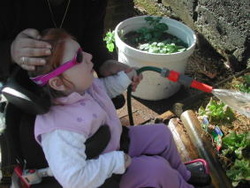- Home
- Why Greenstone
-
Services
-
Gallery
- Dementia sensory gardens
- International School grounds design - AAS Moscow
- Natural play in Early Years - North Islington
- Sensory play gardens - Hickory House
- Special needs schools - sensory play
- Sensory gardens for mental health - residential care village Norwood
- Stressed execs - residential sensory gardens
- Outdoor classrooms and community gardens
- Eco resorts - Portugal, Malaysia
- News
- Links
- Publications I Press
Social and therapeutic horticulture
Therapeutic and healing garden design offers education, treatment and recreation for residents, staff, families and the wider community.
- care homes and special schools -

Sight impaired children love gardening
Social and therapeutic horticulture is the gentle art of gardening, formalised into a programme of activities for at risk or vulnerable individuals. Disengaged students, young refugees, the disabled, patients recovering from trauma or injury all benefit from working with nature in an appropriately-designed garden setting.
Greenstone Design UK designs social and therapeutic gardens for schools and rehab gardens in hospitals and care homes. Elements of therapeutic gardens design include walkways within the garden structure, providing places for gathering and solitude, for working and resting, for visiting and observing, and playing and learning … all designed to support the well-being of garden users.
In a mixed use wellness garden, it is good to incorporate a children’s area with natural play and equipment, sensory garden and place for families to gather. “Through the use of perimeter planting walls and planters, a vine-draped trellis, raised camomile lawn, a butterfly garden, as well as plantings and ornamental fencing it is possible to create a secure area with active and quiet zones,” says specialist rehab garden landscape designer Gayle Souter-Brown.
Thrive, the UK charity that uses gardening to change the lives of disabled people found that: "On our stroke programme held at our gardens in Battersea Park, five out of seven participants reported outcomes experienced which reduced their dependence on NHS funding:
• no need for speech or physiotherapy sessions
• reduction/elimination of pain control medication
• reduction/elimination of sleep medication
The participants now meet for monthly gardening sessions at their homes. Six out of seven have changed their eating habits to include more fruit and vegetables and four now garden regularly and grow their own vegetables."
"Horticultural therapy is a sub group of occupational therapy but is more holistic. Research is key to standardising Social and Therapeutic Horticulture," says Sir Richard Thompson, President of the Royal College of Physicians.
With thanks to alexthomas6 the following video shows the benefits of therapeutic gardening for people with dementia.
Greenstone Design UK designs social and therapeutic gardens for schools and rehab gardens in hospitals and care homes. Elements of therapeutic gardens design include walkways within the garden structure, providing places for gathering and solitude, for working and resting, for visiting and observing, and playing and learning … all designed to support the well-being of garden users.
In a mixed use wellness garden, it is good to incorporate a children’s area with natural play and equipment, sensory garden and place for families to gather. “Through the use of perimeter planting walls and planters, a vine-draped trellis, raised camomile lawn, a butterfly garden, as well as plantings and ornamental fencing it is possible to create a secure area with active and quiet zones,” says specialist rehab garden landscape designer Gayle Souter-Brown.
Thrive, the UK charity that uses gardening to change the lives of disabled people found that: "On our stroke programme held at our gardens in Battersea Park, five out of seven participants reported outcomes experienced which reduced their dependence on NHS funding:
• no need for speech or physiotherapy sessions
• reduction/elimination of pain control medication
• reduction/elimination of sleep medication
The participants now meet for monthly gardening sessions at their homes. Six out of seven have changed their eating habits to include more fruit and vegetables and four now garden regularly and grow their own vegetables."
"Horticultural therapy is a sub group of occupational therapy but is more holistic. Research is key to standardising Social and Therapeutic Horticulture," says Sir Richard Thompson, President of the Royal College of Physicians.
With thanks to alexthomas6 the following video shows the benefits of therapeutic gardening for people with dementia.
|
Services
> edible gardens > planting plans > resorts > community gardens > gardens for health > urban design > air quality > natural play > inclusive play > sustainable playgrounds > outdoor learning > special needs > school grounds design > inset day & CPD training > social & therapeutic > sensory gardens > wellness gardens |
Greenstone Design UK Ltd is registered in England & Wales No.06944998. Registered Office: Alderbrook, Abinger Hammer, Surrey RH5 6SA UK. VAT registration No 976 3017 05 |
Corporate Social Responsibility | Diversity & Equality | Environmental Policy
Quality Management Statement
© Greenstone Design UK Limited 2001-2020 All rights Reserved
Based on the Surrey-Hampshire border we work locally, nationally and internationally to advise and design gardens for health and well-being
